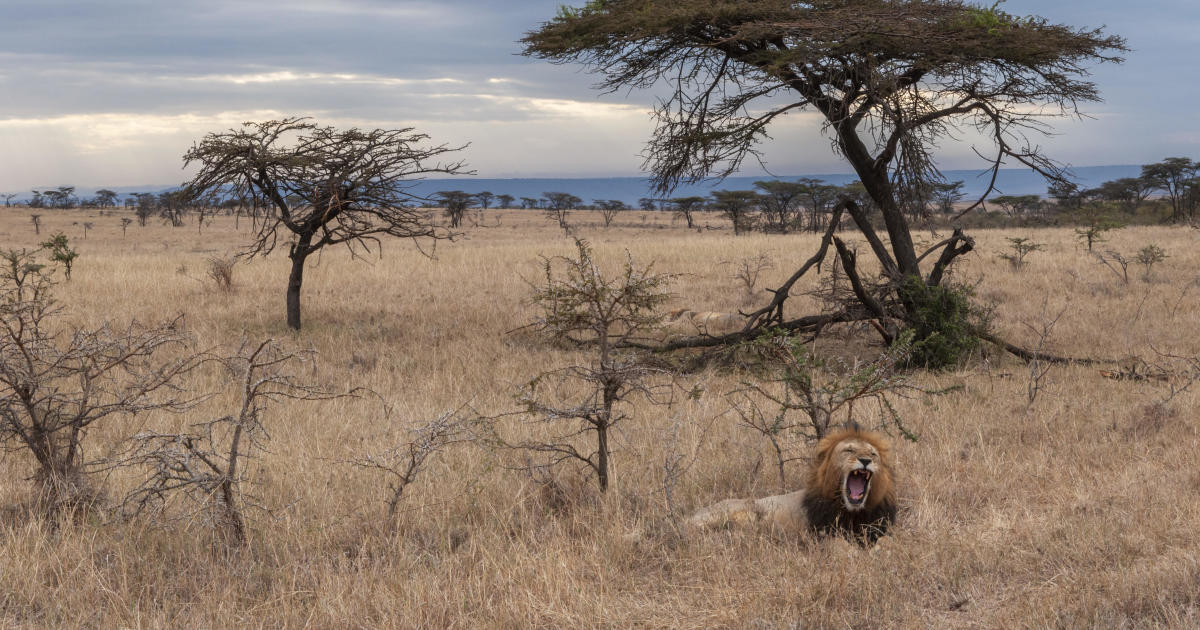CBS News
Lions are being forced to change the way they hunt. It’s all because of a tiny invasive ant, scientists say.

A tiny invasive ant muscled into a Kenyan savannah and sparked such a dramatic transformation in the landscape that even the local lions changed the way they hunt, according to research published Thursday.
The study highlights the potentially profound impacts of invasive species, which are spreading at an increasing rate as human activities give animals, insects and plants opportunities to hitchhike into new territories.
“Oftentimes, we find it’s the little things that rule the world,” said Todd Palmer, an ecologist from the University of Florida, who was part of the research team that traced the implications of the big-headed ant on the hunting habits of lions in central Kenya.
“These tiny invasive ants showed up maybe 15 years ago, and none of us noticed because they aren’t aggressive toward big critters, including people. We now see they are transforming landscapes in very subtle ways but with devastating effects,” Palmer said.
It all starts with the whistling-thorn acacia trees in the plains of Laikipia, Kenya.
Sergio Pitamitz/VWPics/Universal Images Group via Getty Images
These thorny trees had developed a mutually beneficial relationship with the local acacia ant: The trees provide shelter and food for the ants and in return they use their stinging bite to discourage hungry elephants from devouring the trees.
But the big-headed ant changed all that.
Thought to have originated on an island in the Indian Ocean and brought to the area by the movement of people and goods, these invasive marauders arrived around two decades ago and started killing the acacia ants, leaving the whistling-thorn trees vulnerable to herbivores.
Diminished tree cover poses a problem for lions because they rely on the element of surprise to ambush their prey, notably zebras.
Researchers spent three years in Kenya’s Ol Pejeta Conservancy tracking the lions’ movements with GPS collars to see how they responded in the areas colonized by the invasive ants.
Their study, published in the journal Science, found that the big-headed ants had led to a threefold decline in zebra killings.
“This study was a beautiful snapshot of how complicated ecosystems can be — this idea that you pull on a single thread and the whole system reacts,” said Meredith Palmer, an ecologist who was not involved in the study.
The researchers were surprised to find that the ants’ impact did not cause the lion population to decline — good news because lion populations in the region have already shrunk to around 2,000 individuals from an estimated 100,000.
Instead, the big cats switched dining preference and strategy — ganging up in larger groups to go after buffalo, said Douglas Kamaru of the University of Wyoming, lead author of the study.
While the lions have adapted thus far, the big-headed ants could spell trouble for other species that rely on the whistling-thorn tree, like giraffes or the critically endangered black rhino.
“The question is what happens going forward,” Kamaru told Agence France-Presse.
And the lions’ changing diet may provoke its own cascade of impacts.
“We don’t yet know what could result from this profound switch in the lions’ hunting strategy,” Palmer said.
Last year, the intergovernmental science advisory panel for the U.N. Convention on Biodiversity catalogued more than 37,000 so-called alien species that have taken root — often literally — far from their places of origin.
That number is trending sharply upward, along with the bill for the damage, estimated at well over $400 billion a year.
Research has shown that climate change has exacerbated the situation. One study found that at least a third of new introductions of invasive species in the last 200 years have occurred since 1970.
In November, a different study looked at how warming temperatures have changed the hunting habits of cheetahs. Researchers found that the speedy cats — usually daytime hunters — shift their activity toward dawn and dusk hours during warmer weather. That sets them up for more potential conflicts with mostly nocturnal competing predators such as lions and leopards, the study said.
CBS News
Trump makes more Cabinet picks but some top economic posts remain unfilled

Watch CBS News
Be the first to know
Get browser notifications for breaking news, live events, and exclusive reporting.
CBS News
Open: This is “Face the Nation with Margaret Brennan,” Nov. 24, 2024

Watch CBS News
Be the first to know
Get browser notifications for breaking news, live events, and exclusive reporting.
CBS News
Popular gluten free tortilla strips recalled over possible contamination with wheat

A food company known for popular grocery store condiments has recalled a package of tortilla strips that may be contaminated with wheat, the U.S. Food and Drug Administration said Friday. The product is meant to be gluten-free.
Sugar Foods, a manufacturing and distribution corporation focused mainly on various toppings, artificial sweeteners and snacks, issued the recall for the “Santa Fe Style” version of tortilla strips sold by the brand Fresh Gourmet.
“People who have a wheat allergy or severe sensitivity to wheat run the risk of serious or life-threatening allergic reaction if they consume the product,” said Sugar Foods in an announcement posted by the FDA.
Packages of these tortilla strips with an expiration date as late as June 20, 2025, could contain undeclared wheat, meaning the allergen is not listed as an ingredient on the label. The Fresh Gourmet product is marketed as gluten-free.
Sugar Foods said a customer informed the company on Nov. 19 that packages of the tortilla strips actually contained crispy onions, another Fresh Gourmet product normally sold in a similar container. The brand’s crispy onion product does contain wheat, and that allergen is noted on the label.
U.S. Food and Drug Administration
No illnesses tied to the packaging mistake have been reported, according to the announcement from Sugar Foods. However, the company is still recalling the tortilla strips as a precaution. The contamination issue may have affected products distributed between Sept. 30 and Nov. 11 in 22 states: Arizona, California, Colorado, Florida, Georgia, Iowa, Idaho, Illinois, Indiana, Maryland, Maine, Michigan, Minnesota, North Carolina, New Jersey, Ohio, Oregon, Pennsylvania, Texas, Utah, Virginia and Washington.
Sugar Foods has advised anyone with questions about the recall to contact the company’s consumer care department by email or phone.
CBS News reached out to Sugar Foods for more information but did not receive an immediate reply.
This is the latest in a series of food product recalls affected because of contamination issues, although the others involved harmful bacteria. Some recent, high-profile incidents include an E. coli outbreak from organic carrots that killed at least one person in California, and a listeria outbreak that left an infant dead in California and nine people hospitalized across four different states, according to the Center for Disease Control and Prevention. The E. coli outbreak is linked to multiple different food brands while the listeria outbreak stemmed from a line of ready-to-eat meat and poultry products sold by Yu-Shang Foods.









